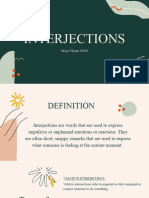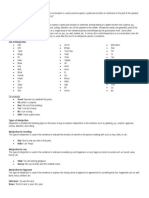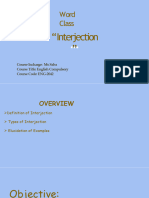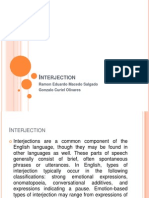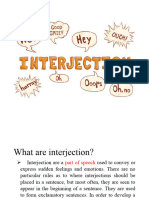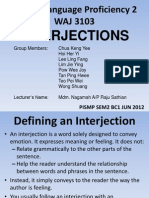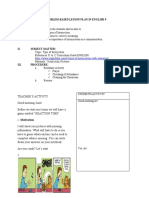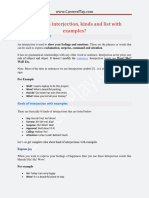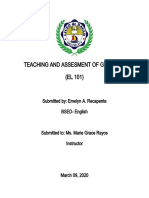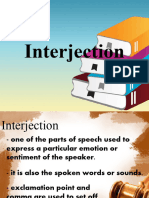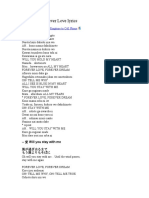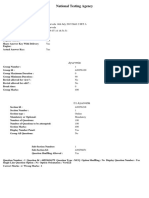Definition of interjection
An interjection is a word or phrase used to express a feeling or to request or demand something. They
are not grammatically connected to other parts of a sentence and are common in everyday speech and
informal writing. Interjections can be classified into three types of meaning: volitive, emotive, or
cognitive.
Types of interjection
Volitive interjections are words or phrases used to express a desire or an urgent request. They
are often found at the beginning of a sentence and can be followed by an exclamation mark.
These interjections are used to convey a feeling or to add emotion to a statement. Some
common volitive interjections include "please," "thank you," and "sorry".
Examples of volitive interjections in sentences:
"Come, I'd like to show you something in the backyard."
"I still have one more piece of luggage to pack. Wait!"
"Ey, can I talk to you for a second?"
"Oy, come look at this sick view!"
"Quiet! I think I hear something outside the tent."
Volitive interjections are used in everyday conversations and can help convey a wide range of emotions
or desires. However, it is essential to use proper intonation and stress when using these interjections to
effectively express the intended emotion. In formal speech or writing, using interjections is not
appropriate.
Emotive interjections are words or phrases used to express sudden and intense emotions. They
can convey a wide range of feelings, such as excitement, surprise, happiness, sadness, anger, or
frustration. These interjections are often used in informal speech and can add emotion to a
statement. Some common emotive interjections include:
"Wow!" "Gee!"
"Yay!" "Grr!"
"Eh!" "Mmph!"
"Aah!" "Oof!"
"Chut!" "Ooh!"
"Doh!" "Ow!"
�"Zut!"
Emotive interjections are typically used in speech and can be a reaction to intense emotions that a
person experiences in a particular moment. They are often used freely in speaking, regardless of
grammatical rules. In formal speech or writing, using emotive interjections is not appropriate.
Cognitive interjections are words or phrases used to express thoughts or thought
processes. They can convey a speaker's mental state or reaction to an event. These interjections
are often used in informal speech and can add a window into a person's inner thoughts and
feelings. Some common cognitive interjections include:"Hmm"
"Um" "Mhm"
"Ah" "Mmm"
"Aha" "Oh"
"Ch" "Ow"
"Huh"
Cognitive interjections are typically used in speech and can be a reaction to intense emotions or
thoughts that a person experiences in a particular moment. They are often used freely in speaking,
regardless of grammatical rules. In formal speech or writing, using cognitive interjections is not
appropriate. When using cognitive interjections in creative writing and other types of informal written
communication, they are used with proper punctuation, spelling, and frequency. Context is also an
important element, as these interjections need sufficient background to make sense.
Interjections are diverse and can encompass various parts of speech, such as exclamations, curses,
greetings, response particles, hesitation markers, and other words. They are often used in informal
conversations and can add emotional depth to a sentence. However, it is recommended to avoid
interjections in formal or academic writing.
Conclusion
Interjections are simple, expressive pieces of language that indicate a short expression of sudden strong
emotions, moods, or feelings. They can show emotion or feelings, stand alone, or be found within a
sentence. There are three types of interjections: cognitive, emotive, and volitive. Interjections are
generally too spontaneous and expressive for written English and are more commonly used in spoken
English. They are often found at the beginning or the end of a phrase that describes what caused the
sudden emotion. While interjections can add emphasis or emotion to statements, they are more
�common in casual contexts and informal conversations, and their use in formal writing should be
avoided.
REFERENCES
Ryan, E. (2022, November 16). What Is an Interjection? | Examples, Definition & Types. Scribbr.
Retrieved December 11, 2023, from https://www.scribbr.com/parts-of-speech/interjections/
Aarts, B. (2011). Oxford modern English grammar. Oxford University Press.
Butterfield, J. (Ed.). (2015). Fowler’s dictionary of modern English usage (4th ed.). Oxford
University Press.
Garner, B. A. (2016). Garner’s modern English usage (4th ed.). Oxford University Press.



